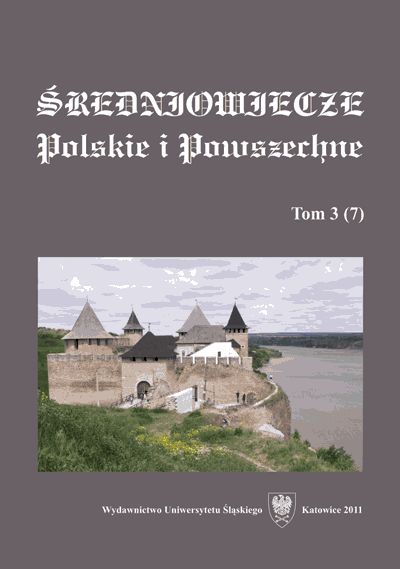Elita ziemi dobrzyńskiej na przełomie XIV i XV wieku. Między zakonem krzyżackim a Królestwem Polskim
The elite of Dobrzyń at the turn of the 14th and 15th centuries. Between the Teutonic Knights and Kingdom of Poland
Author(s): Sobiesław SzybkowskiSubject(s): History
Published by: Wydawnictwo Uniwersytetu Śląskiego
Summary/Abstract: An inclusion of Dobrzyń in the form from 1392 by the Teutonic Knights led to a polarization of the gentry of the elite in question. The party approving of the order authorities constituted the majority of the representatives of the Dobrzyń line of Ogon family led by an unquestionable leader of this family circle, notably Andrzej of Radziki, a castellan from Dobrzyń. Likewise, Piotr Świnka the First, a senior of Świnka family, and a castellan from Rypin, brought with him all relatives. A different story was in the case of the family of Pierzchała from Radomin, where the oldest son of marshal Iwan, one of the leaders of the pro-knight camp, Piotr who entered the service of Władysław Jagiełło before pledge, remained there also between 1392 and 1405. The kingdom party comprises the most important representatives of the line of Dołęga, who joined their senior judge Andrzej Słup en masse, although some of them were in Dobrzyń (master of the hunt Kanimir, Stefan from Wierzbicko, Jan Kretkowski) during the knight authorities. Similarly, in the kingdom party and emigration beyond Dobrzyń were all Leszczyce from Dobrzyń: brothers Kosisko. The sources concerning political behaviours of Jastrzębce from Dobrzyń also show that they are in favour of the Kingdom (Chełmicki and Grochowalski families) rather than among knight advocates. Slightly different was the situation in the line of Godziemba from Dobrzyń. In which Bierwołd from Głowina chose allegiance to the Kingdom emigrated beyond Dobrzyń while Jakub from Maliszewo remained in Dobrzyń during the knight authorities and even was a witness of many documents issued there. Different political choices can also be seen in the case of two knight families which possessed lands from Dobrzyń during the ruling of Władysław Opolczyk. Piotr Lebel from Osiek chose the service at the Teutonic Knights whereas older Janusz Sztembarski was in favour of Władysław Jagiełło. The family of Rasz from Starorypin, deriving from Prussia and possessing family lands there, on the other hand, approved of the Teutonic Knights.
Journal: Średniowiecze Polskie i Powszechne
- Issue Year: 2011
- Issue No: 7
- Page Range: 87-119
- Page Count: 33
- Language: Polish

